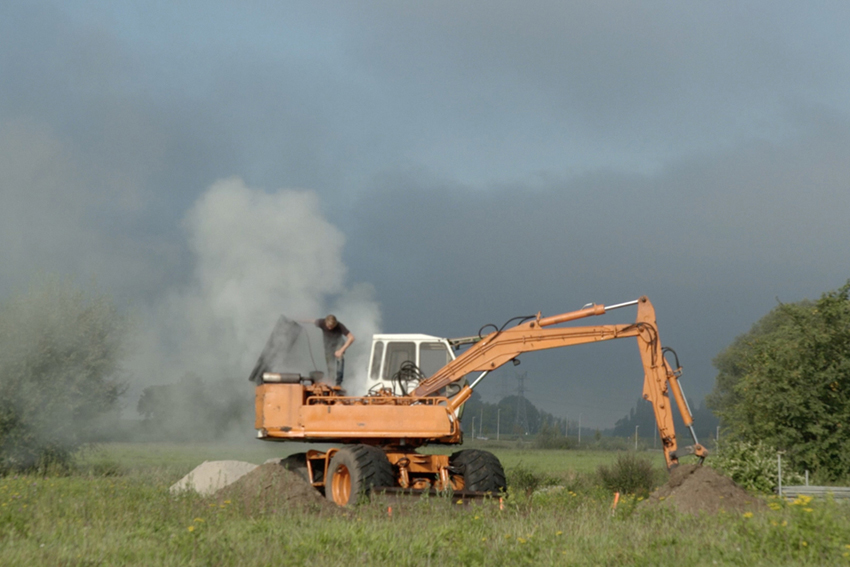Issue 38
Bram Kuypers
ADAPTING (TO) GOD
Seeing is believing

God has created the universe, earth, all living beings and mankind. But after we
ate fruit from the forbidden tree of knowledge, God kicked us out of paradise and
closed the entrance to it. Here we are now with our knowledge, not being able to
bridge the gap between God and us. Yet, we do know where to find him, because
God's house is Heaven. But although his love seems welcoming enough to allow
everybody into Heaven, one has to go through extreme measures before entering
it. First of all, one has to die, and secondly; one should have lived a good life. But
maybe most important of all is the demand that one has to believe in God.
So getting to Heaven requires some adaptions before being able to enter. But
entering a space is always a question of compatibility; we often need to adapt to
the characteristic circumstances of a place when entering it. The moon and the
deep sea are, for example, places where one needs a technical device to go to.
Thus, a rocket or submarine allows us to move into environments we otherwise
would not be able to enter, are the cabins of these vehicles also spaces in
themselves. The experience of the seabed is in the end mostly a visual one, and
not entirely physical.
Our three-dimensional perspective upon reality is a consequence of our eyes
being the main instrument to observe. This results into our spatial awareness and
characteristic ability to estimate distances. Concepts about distance, speed,
duration or format are, therefore, all spatial terms to describe the appearance and
potential of our reality. Even when we are not able to enter a space physically, the
experience of the space will still be spatial. Through seeing we can therefore let
our mind go beyond the physical space in which we are present, and make a
mental or transcendent movement into different dimensions.
The often-used phrase "seeing is believing" illustrates how important visual
perception is when considering something as real. We easily consider the visible
as being reality. When artists were part of a society dominated by the church,
dedicating yourself to visualizing religious themes was common. Artists
contributed in keeping religion reliable by showing the biblical stories it was
based on. But biblical scenes or God where not physically present to be observed
and depicted. Artists had to rely on their faith to grasp an idea about Gods
heavenly kingdom.
Therefore, imagination plays a vital part in seeing and believing concepts very
distant to you.
[1]
When we look at pictures of space recorded by advanced cameras aboard
autonomous vehicles travelling to phenomena's in our universe. We believe these
pictures resemble something true, and such accomplishments are often remarked
as something "we went to". But actually we combine images and information to a
concept we experience as a space, even without entering it with the body. Part of
the overwhelming effect of these pictures is, therefore, not only the visual beauty
of such depicted spaces; but also an awareness of distance towards it.
[2]
Now if we climb a mountain and look at the landscape surrounding it, the ability
to see into the distance reveals the space between the horizon and us. But in a
picture of a distant galaxy there is no visible space in between. We can only try to
imagine this space because of some information that accompanied the picture. In
both situations, however, our awareness of distance lets us experience an
enormous amount of potential space that lies in between where we are, and what
we see. A similar experience occurs when thinking about God or Heaven; both are
so distant we can't really grasp them. Their potential existence lies beyond one's
own observation, knowledge and, lifespan. The only possible solution to
overcome the distance is having faith in a good shepherd guiding us through.
Believing is therefore crucial for the human urge to expand his/her knowledge.
Columbus, for example, believed he could sail west and discover a faster route to
China because he had faith in the concept of a round earth, although at the time
nobody had literally seen earth as a whole. But due to navigational methods of
that time, sailors and map drawers concluded that the earth could only be round
instead of flat. The concept of the earth's shape was thus determined based upon
signs. Through observing their environment people are able to imagine and
estimate a reality that might yet be metaphysical to them.
Spinoza concluded that God couldn't be an individual because he saw His
intelligence within all natural creatures. Spinoza's observations made him doubt
his earlier observations and this led to his new perspective on reality and God's
presence in it. But interestingly Spinoza's ideas were "too far ahead" of his time.
Thus his ideas where only widely considered real when others such as Isaac
Newton, began to view the world from the same perspective.
Then Einstein said; "God does not roll the dice", meaning; although the logic of
the universe can't yet be understood by humans, it surely is not a matter of
coincidence. To which Bohr replied; "Stop telling God what to do!", stating that it
is exactly such human determination that is shaping the universe.
So as our knowledge expands, God seems to move along. God is therefore been
seen the behaviour of animals, the world above the clouds, and metaphysical
structures of atoms. But each time we expand our knowledge, God will hide
behind the horizon.
It is no coincidence that the tree of knowledge was forbidden to us in the
Garden
of Eden. By gaining knowledge we became distant to God, because he cannot be
known. Therefore, believing is the only way of getting closer to something like
God. While believing we overcome knowledge and facts as our only means of
orientation, and we trust the signs of a greater reality. The more signs we
encounter, the more we believe in this reality.
Observation, imagination and faith are the foundation for people to attempt
crossing a gap between their known perspective and the possibility of another
reality. A lack of knowledge is therefore crucial for believing, but believing is
crucial to gain knowledge.
[1] https://www.youtube.com/watch?v=hY8C3cIMR4o
[2] https://www.youtube.com/watch?v=g1fPhhTT2Oo


Atlas, 2017, site-specific performance and installation - attempt to bury an excavator by itself.
Plane Paper Plane, 2016, 256 sheets of paper & 90 meters of tape, 4,5 x 2 meter - attempt to fold an airplane out of one package A4 paper.
text written for texted archive, 2017